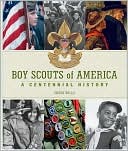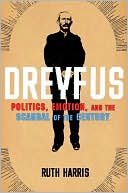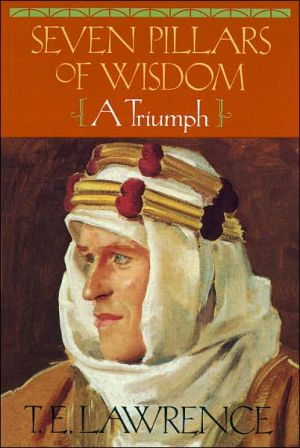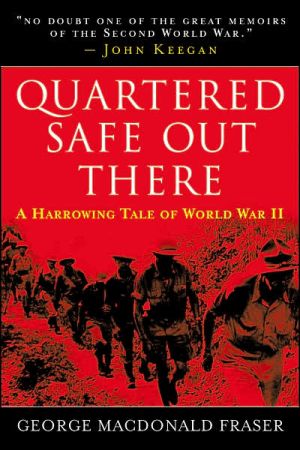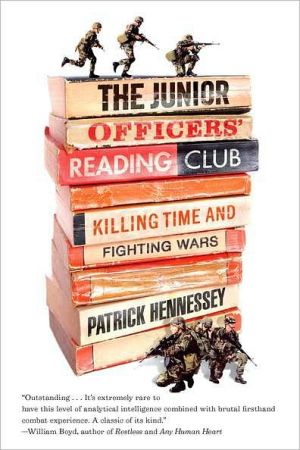Reach for the Sky: The Story of Douglas Bader, Legless Ace of the Battle of Britian (Bluejacket Books Series)
Douglas Bader was a legend in his lifetime. After losing both legs in a 1931 air crash and being dismissed by the Royal Air Force, he fought his way back into the cock-pit of a Spitfire and became one of the great heroes of the Battle of Britain. Bader's story is so extraordinary that no one would dare invent it, and his accomplishments have been an inspiration to many. Told he would never walk without a cane, Bader became not only one of the RAF's top combat pilots but a squadron leader and...
Search in google:
Douglas Bader was a legend in his lifetime. After losing both legs in a 1931 air crash and being dismissed by the Royal Air Force, he fought his way back into the cock-pit of a Spitfire and became one of the great heroes of the Battle of Britain. Bader's story is so extraordinary that no one would dare invent it, and his accomplishments have been an inspiration to many. Told he would never walk without a cane, Bader became not only one of the RAF's top combat pilots but a squadron leader and innovator of fighter tactics. Among the thrilling incidents chronicled in this book are his first successful encounter with an enemy plane, the shoot down of his own plane, and his succession of escapes from the Germans.
Chapter One \ \ \ In 1909 the doctor warned Jessie Bader during her second pregnancy that the baby might not be born alive and that it would be risky for her to go ahead with it, but, rather imperiously, she resisted any interference. A tall and strikingly attractive girl of twenty with a cloud of black hair piled in thick Edwardian waves, Mrs. Bader was sometimes emotional and generally wilful.\ Frederick Bader brought his young wife and the other baby, Frederick, or 'Derick, home to England from India on furlough for the birth and they took a house at St. John's Wood. The doctor and midwife arrived on 21st February, 1910, and Frederick Bader walked restlessly round the house. Jessie's sister, Hazel, and the German nursemaid waited hours outside the bedroom door until a thin but persistent cry broke the quiet; a little later the door opened and the doctor came out with the pleased look of a family G.P. who has seen his friends through a crisis.\ "The little trouble-maker has arrived," he said benignly. "It's a boy." The squalling kept sounding through the door and the doctor observed that the "little trouble-maker" seemed to have a talent for expressing himself forcibly. (The doctor is not alive now to marvel at the unwitting accuracy of his foresight.)\ They christened the baby Douglas Robert Steuart; and the "Steuart," from his maternal great-grandfather, was not all that the baby inherited from the intractable John Steuart Amos, who drove to the Liverpool docks in the family carriage one day in the 1840's, got out pulling a kitbag after him, andtold the coachman, "You may tell the family I will not be returning." He walked on board a windjammer, talked himself into a job as ship's carpenter (though he knew nothing about either ships or carpentry) and worked his passage to India.\ Ambition fortified his unruly spirit and in a few years John Amos was an officer in the Indian Naval Service. A photograph shows his character: within a fringe of crisp, black beard, large eyes with a bold dominating stare, and thin, straight lips clamped together. Not the face of a compromiser. He married, and later appalled his family of daughters by telling them how he watched the ringleaders of the Mutiny lashed across the cannon's mouth and blown out of this world. A detached hand flying through the air slapped him across the face and (he told the shuddering girls) dropped into his pocket.\ His eldest daughter, Jessie, was least appalled by the story. She had her father's bold eyes and tight mouth and was impervious to fear. In the eighties she married a gentle engineer in India called McKenzie, and they had two daughters, Jessie and Hazel. Mr. McKenzie died then, and his wife brought up the two girls with a resourceful hand. They lived at Kotri, in the troublesome north-west (now Pakistan), but having no man in the house did not daunt the formidable Mrs. McKenzie. One night she and the two little girls were woken by a sound downstairs. She handed each terrified child a golf club, shepherded each into a strategic point behind a door and said, "Stand there and if anyone comes past ... hit him." Then she strode through the house brandishing a niblick and shouting in a menacing voice, "Where are you? Come out at once."\ No one came out. The thief, if it was a thief, vanished into the night.\ Another time a face appeared at a window in the middle of the night. Mrs. McKenzie swung out of bed and ran, not away, but at the window. The owner of the face ran the other way.\ Hazel was not fond of the dark but her mother brushed such fears aside, saying boldly, "I'd walk through a graveyard at midnight." Hazel shuddered. "Have no fear, God is near," said her mother. Hazel wanted to say that that would be all very well if she could see Cod, but prudently left it unsaid. She was a pretty girl who had inherited her father's gentleness, but it was becoming clear that her sister, Jessie, had inherited the mettle of John Steuart Amos and her mother. She had the large bold eyes, but this time long-lashed, darker and wide-set under arching brows. Her lips were full but had the same compressed look, and the jaw was substantial.\ She was seventeen when she met Frederick Roberts Bader at the club which was the usual social centre for the district, and she was eighteen when she married him. He was twenty years older, a gruff, heavily moustached, almost confirmed bachelor captivated by the vital girl. Where Jessie was tall and slim, Frederick Bader was heavy-set, a civil engineer of note with thinning hair and a capacity for expressing himself forcefully (he and his temperamental bride had that in common.) They lived comfortably in the hot, dry plains around Sukkur and Kotri, and a year later the first baby was born. They christened him Frederick and called him 'Derick to distinguish him from his father. Both of them doted on 'Derick and within a year all three were on their way back to England for Jessie to have the second baby.\ Three days after Douglas was born in St. John's Wood, both mother and baby caught measles, and as soon as both were better Jessie had to have a major operation. From the start baby and mother were virtually separated. Jessie recovered, though she had no more children, and then the family was due back in India. Douglas was only a few months old; a little young, they thought, for India's climate, so they left him with relatives on the Isle of Man.\ He was almost two by the time he was taken out to join the family in Sukkur and that may have been the beginning of the loneliness that has been deep within him ever since. He was a stranger in India, like an affectionate puppy before he has been smacked for wetting the floor. 'Derick had been receiving the attention lavished on an only child and the new boy did not fit in. Their Aunt Hazel, visiting the Sukkur bungalow from Kotri one day, saw Douglas's face covered in little sores. Jessie said 'Derick had been pinching bits of skin off his face. 'Derick at four had vitality from both parents. Douglas, two and a half, was sweet-tempered but subdued.\ Six months later, servants were constantly on duty to keep them apart—Douglas had begun fighting back like a tiger. It seemed that he, too, had inherited a bold vigour. From then on he always fought his own battles and never cried if he lost. The only times he cried were when his father and mother and 'Derick went visiting in the car and left him behind, which they often did.\ In 1913 his father resigned his job in India to study law, and the family left for England and took a house in Kew, breaking three generations of residence in India. In that twilight year before war came to write an ending and a new beginning to England's ways, the Bader household was adjusting to a life where servants were not so plentiful. Jessie and Frederick still had their matrimonial differences which they aired with vigour, and the two boys, together in the care of one nanny instead of separated by servants, were a handful. Douglas could usually hold his own in scuffles, but when crises had to be resolved by parental judgment 'Derick had an advantage: in Jessie's indulgent eyes he could do little wrong.\ Then the war came and Frederick Bader was commissioned in the Royal Engineers and went to France. Douglas, now a spirited five-year-old, was ever ready to show his mother and 'Derick that he was no minor underling, and 'Derick, finding he would leap at any challenge, used to dare him to carry out hazardous or punishable exploits. Never refusing a dare, Douglas came to be considered as much the naughtier of the two. Soon he regarded punishment as an inevitable part of life and so was able to endure it stoically.\ One hurtful incident was when a ball bounced over tall, spiked railings into a locked churchyard near Kew Bridge. Dared by 'Derick to climb over the railings, Douglas ran at them and pulled himself to the top, where his foot slipped and his behind was impaled on one of the sharp spikes. White-faced, he hung on with his hands, unable to move. At last the nanny arrived and prised him clear and he walked silently half a mile to the house, gripping her hand with pain. The doctor put eight stitches in his rump without the patient letting out a murmur.\ Soon Douglas joined 'Derick at Colet Court, a nearby prep. school. Their Aunt Hazel was back from India and usually escorted them to and from school in the bus, a series of nightmare journeys which she still remembers vividly as they seldom stopped fighting in their struggle for supremacy. Though 'Derick was spirited, Douglas was even more so, and as he had never enjoyed the same attention, felt he had to assert himself. Yet he only became combative when affairs threatened his amour propre. Otherwise he bubbled with life, warm-hearted, impulsive, and insulated against rebuffs.\ At Colet Court he had his first fights and they were always with bigger boys. Always the same story: bigger boys expect smaller boys to know their place and Douglas would net be forcibly put there. After a while there were not so many fights because he never lost one, though he fought several bloodstained draws: then the generosity showed because he had a tendency to stop fighting when he had hurt someone.\ 'Derick went on to prep. school at Temple Grove, near Eastbourne, and there was a little more peace in the house, except during the holidays when 'Derick was home and Douglas was relegated again to second place.\ The boys seldom saw their father, who was in the thick of it in France. In 1917 shrapnel wounded Major Bader badly in the head. They could not get all the shrapnel out, but he recovered without home leave and went back into the fighting.\ Douglas followed 'Derick to Temple Grove and fairly soon scored his first knock-out. A bigger boy twisted his arm and Douglas clouted him across the face with his free hand. Honour demanded a proper fight, in which the bigger boy rushed at him. Douglas stood his ground, ducked his head, thrust both fists out together, and the boy rammed his chin against them and went down, out cold for several seconds. Thinking he had killed him, Douglas knelt contritely by the body and was most relieved to see the eyelids flicker and open.\ Temple Grove was a pleasant old school with plenty of playing fields. The regime quickly drew the new boy into organised games and overnight he seemed to flare up like a Roman candle with eagerness. It was the perfect outlet for his mercurial nature and he literally threw himself into rugger, a gritty and indestructible small boy bouncing up as fast as he was knocked down, which was often. Fast on his feet and fast-thinking, he shone as fly-half, and after the first few games was promoted to more senior teams, finding himself now, as in all his fights, matched against bigger boys. It only made him more determined to hold his own.\ In the gym he limbered up on the parallel bars or the horizontal bar, the vaulting horse or in the boxing ring; he would try anything, not just once but till he had mastered it, hating to let anything beat him. Or anyone. People lost count of the times he fell off the parallel bars, but he learned to fall without hurting himself; in fact he lost all fear of falling, and that, as he later discovered, was one of the most important things that ever happened to him.\ At home in the holidays without the outlet of sport, the favoured 'Derick talked his mother into buying them bows and arrows. They started shooting at each other first, and then as they became too accurate for comfort took to ambushing passers-by. A hedge ran along one side of the house just high enough for hats to bob invitingly over the top as men passed, and irate men with arrow-dented bowlers kept banging on the door-knocker.\ Now the war was over but still they rarely saw their father, who was still in the Army, still on the Continent and busy helping repair war damage. Even after that he was retained in France on the War Graves Commission.\ Meantime Hazel had married an R.A.F. flight lieutenant, Cyril Burge, who had flown most of the war in the Royal Flying Corps. He fascinated Douglas by the wings and ribbons on his tunic and his stories of the war. Burge was likewise attracted by the boy who seemed at times so vital as to be "almost on fire," a good-looking youngster with large clear blue eyes and frank gaze, a mouth that grinned easily, crisp curly hair and a square jaw, an oddly commanding face for a small boy. 'Derick looked very like him, but without quite the same intensity in the face.\ Back at school, Douglas shone at cricket too, being a reasonable bowler, miraculously quick as a fieldsman and a batsman who believed that the ball was there to be hit, not blocked.\ By tradition at Temple Grove all boys carved their names on desks. Douglas tried but made a botch of it, and 'Derick was a shade scornful. They were walking near the garden where the headmaster grew huge vegetable marrows. "I bet I could do a corker carving on that," Douglas said, not very seriously, eyeing the largest marrow.\ "Bet you're not game," said 'Derick provocatively. "I dare you." Douglas carved "D. Bader" in large and immature print on the headmaster's prize marrow. He deserved no sympathy. Nor did he get any.\ Though he always tried to the limit at games he never tried hard in the classroom. He did not really have to because his mind was quick and receptive; he picked up Latin and Greek with ease and was often top of his form, but never worked harder than just enough. Academically, he was lazy because he was not interested. Maths and other modern subjects he detested and did the barest minimum of work on them so that his reports usually said, "Very good, but could do better if he tried." He was turning out to be impregnably obstinate about things he did not want to do, having, like his mother, a will of his own.\ The P.T. instructor, Crease, a retired chief petty officer with a beard, who looked like the man on a Player's cigarette packet, taught him to shoot. Crease drilled it into him to get his bead and shoot quickly before the sight became blurred with concentration, and he became accurate and fast in shooting (which years later cost men their lives).\ Once they put him in a hockey team against some girls from a neighbouring school, and he played robustly, scorning chivalry. One of his shots missed either the goal or girl at which it was aimed and bounced off a slow-moving master's skull with a satisfying thud which brought Bader Minor some hero-worship. He was barred from playing against girls any more and that delighted him.\ In 1922 a War Office telegram came to the house in Kew regretting that Major Bader had died of his wounds in St. Omer—the shrapnel which had wounded him in the head in 1917. Though the boys had seen little of their father, it did not make Douglas feel any more secure. Later, a more practical effect had to be faced. 'Derick had already gone on to King's School at Canterbury. Now there was doubt whether funds were enough to send Douglas to public school too. The one solution was a scholarship, and a very loath boy began studying, in the galling position of having to prove his reports: "could do better if he tried."\ Not for a moment did he slacken his sporting activity. Not Bader Minor. In that last year he was captain of cricket, captain of rugger, captain of soccer, and in the school sports in the final term won every senior race he could enter for, the 100 yards, 220, quarter mile, half mile and hurdles, then set a new school record for throwing the cricket ball. At term's end the headmaster, with real pleasure, told him he had also won a scholarship to St. Edward's School, Oxford.\ About this time Jessie Bader, dark and vividly good-looking at thirty-two, remarried. The boys' step-father was the vicar of Sprotborough (Yorkshire), the Reverend Ernest William Hobbs, who had been a gentle bachelor of thirty-seven before his life was so radically stirred up. Jessie was devoted to him but still had her outspoken wilfulness, while the two boys resented going up to Yorkshire to live in the rambling rectory with its eight bedrooms, two kitchens, servants' quarters (mostly empty), pump (no running water), lamps (no electricity) and all-pervading cold in winter. Acres of garden and elm-studded grass spread between the house and the handsome church that dated back to the eleventh century and, like the rectory, was too big for the small village of scattered cottages near Doncaster.\ The vicar was too mild for his intransigent new family. He suggested that 'Derick and Douglas might like to mow some of the grass but they flatly refused, and that was that. Jessie was firmer, insisting that the two boys take it in turns to pump the water in the kitchen, and they did so. The vicar tried to institute family prayers after breakfast, but Douglas and 'Derick scuffled and fidgeted and giggled so much that he gave it up. Jessie was inclined to blame Douglas, and he began to feel more at home out of doors.\ That summer he was packed off for a week with Cyril and Hazel Burge at Cranwell, where Cyril was adjutant of the Royal Air Force College (in fact, he was Cranwell's first adjutant, having helped open the R.A.F.'s equivalent of Sandhurst in 1919). It was not then the grand place it is now: no fine white facades planted four-square in tailored acres but a few weedy buildings and barrack huts straggling along the side of a large field which was the aerodrome.\ From Hazel and Cyril the welcome was warm. Only just thirteen, Douglas had never been near aeroplanes before, and when the quiet, good-humoured Cyril sat him in the cockpit of an Avro 504 trainer the thick hair almost vanished as the boy bent over the controls and dials like a terrier. Later he stood for hours in Cyril's garden watching the bellowing Avros taking off over his head as the cadets practiced "circuits and bumps." Every morning at 6.30 he joined the cadets in training runs, doggedly trying to keep up. He admired them enormously; they seemed so fit, and after a couple of days, he spent less time watching the flying and more time with the cadets at cricket and athletics.\ When Hazel and Cyril were putting him in the train for Sprotborough he said with what sounded like a catch in his voice (though it was probably only the voice breaking), "Crumbs, I want to come back to Cranwell as a cadet." Cyril thought he had a convert then but he was a little premature. The flying bug was not in Douglas as yet. Interest —yes, as a boy likes dogs and catapults: but it was the games that drew him. Soon he forgot even that because he went to St. Edward's, and there was all the sport he wanted.\ \ \ Excerpted from REACH FOR THE SKY by Paul Brickhill. Copyright © 1954 by Paul Brickhill. Excerpted by permission. All rights reserved.


